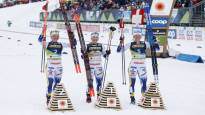On its channels, broadcasts all the events of the Salpausselkä Games from Friday to Sunday, March 24–26. On Wednesday, on channels, the stadium sprint of the Olympic Stadium from 18:55.
Sweden’s women have been so successful on the ski slopes in recent years that it is easy to forget the times from the distant 1990s. At that time, Swedish skiing was on the weak side and the country was completely without a skiing medal at the World Championships in Ramsau and Trondheim.
There has been another this season, for example. In the World Cup, Swedish cross-country skiers have won 12 competitions, and if relays are included, the number is 14. Second places have accumulated 12 (including relays 15) and third places 10 (11). The corresponding numbers for Finnish skiers are 2–5–2.
There will probably be more manna today in Tallinn, when the Swedes rush into the free sprint.
From the World Championships in Planica, the Swedish team arrived home with four world championships, three World Championship silvers and five World Championship bronzes. So there were 12 medals.
– I personally thought that Sweden would take 13 medals. Johan Olsson said.
– We had a couple of bad days when maintenance was not successful. If this had been successful, we could have won even more medals.
Olsson is a six-time Olympic and eight-time World Cup medalist, who is especially remembered for the 50 km world championship in solo skiing in 2013 in Val fi Fiemme.
The number of hobbyists has decreased slightly in Sweden as well, and there are fewer participants in national competitions than in Finland. Despite this, there is quality in Sweden, especially on the women’s side.
According to Johan Olsson, one of the reasons for that can be found in the women’s sprint team. Jonna Sundling, Maja Dahlqvist and Linn Svahn are physically perfect skiers for sprints.
But there haven’t always been similar successful people in Sweden either.
– In Sweden, there has been a lot of investment in sprinting since 2004-2005. So we are talking about almost 20 years. That alone is not enough. In addition to effort, skiers must also have physical qualities, Olsson reminded.
So the conditions have been favorable, skiing has been popular and good individuals have been found in the teams, who have already brought success at the junior level.
In addition to the World Cup competitions, Jonna Sundling has won the Olympic gold and the world championship in sprinting. Success has not come easily, because the Swedish team alone offers such a tough resistance.
– We are strong individuals and we want to develop all the time. We compete with each other and everyone wants to be the best. We can compare the level and development among ourselves. There are many tough people in the team, but everyone still wants to improve, Sundling evaluates why the Swedish skiers are doing so well at the moment.
Swedish women’s coach by Stefan Thomson and in Johan Olsson’s opinion, one important factor in success has been training together. Whereas in Finland you prefer to work alone or only under the watchful eye of a coach, in Sweden you rely on working together.
– We are such a strong team that everyone knows it is beneficial when we train together, Thomson said.
This applies to sprinters as well as standard distance skiers. Although normal distance skiers train a little differently, according to Olsson, they can take advantage of joint training with sprinters.
– Such skiers as Frida Karlsson and Ebba Andersson benefit from having good sprinters on the team. Such qualities are needed in today’s skiing, Olsson said.
According to Olsson, when you train together, you can share knowledge and help others develop. The fact that information trickles down from the national team level to youth teams and clubs is also a key issue for Olsson. He also highlights the importance of role models.
– Charlotte Kalla was a model for many of the current peaks. They saw up close how serious it is to work. They understood what it takes to get to the top. It may have been missing in Sweden on the men’s side. We don’t have the scope that Norway has. And I don’t see that we will be able to reach them in the near future, Olsson uploaded.
Three-time Olympic champion Kalla ended his career last season.
Thomson disagrees with Olsson, as he believes that Swedish men will also raise their level in the future.
– We now have a good generation among women, but we can already see improvement on the men’s side as well. In a few years we will already be higher. At the moment we have a gap between the generations, when Johan Olsson and Marcus Hellner stopped. We almost lost a generation, but in a few years we will definitely achieve results, Thomson assured.
William Poromaa managed to achieve bronze in the 50 km race at the World Championships in Planica, at the Junior World Championships Anton Grahn achieved gold in the sprint and in the World Cup in Falun when he was only 21 years old Truls Gisselman was 16th in the tenth race. The background has shown great potential Alvar Myhlback, who turns 17 on Wednesday. He has already challenged the men strictly.
According to Olsson, the World Cup medals for young people are a very good basis, but in this regard, Sweden has the same problem as Finland: success is on the shoulders of individual athletes, and the same breadth as Norway has is not even expected.
According to Olsson and Thomson, the athlete’s path is well built and club activities are good above all for young people, 10–15 years old.
– The biggest challenge in Sweden is getting 16-20 year olds to stay involved in the sport. A lot of skiers disappear from there. just at the point when betting should become serious, Olsson regretted.
